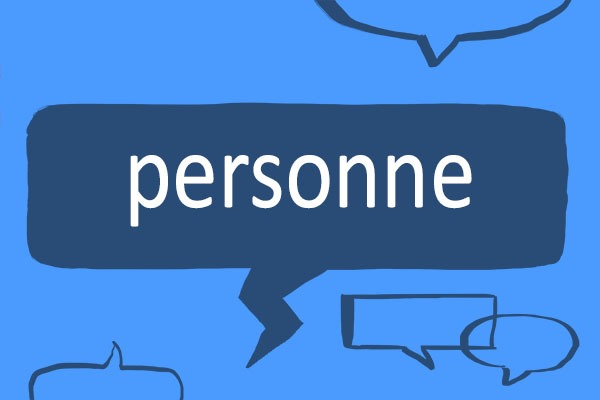In our weekly blog, we choose a French word and explain why it might be of interest to language learners. Our word today is personne.
To start things off, listen to its French pronunciation in the audio clip below:
If you don’t already know what this word means, we know what you’re thinking – personne surely just translates as ‘person’ in English, right? That’s correct, but there’s a bit more to it than that – more on this this point later.
Personne is a feminine noun, which means you might see it preceded by the indefinite article une, or the definite article la. For more information, we have an Easy Learning French Grammar page on how to work out the gender of French nouns.
This word might feel confusing if you’re not used to languages that use gendered nouns. No matter the gender of the person you’re talking about, if you refer to them using personne, this noun is always feminine. That means any adjectival agreement will also be feminine.
The best way to understand how to use personne as a noun is by studying some examples – let’s do that now:
Pierre doit être la seule personne que je connais de Lyon. Pierre must be the only person I know from Lyon.
Franchement, ma tante n’est pas personne de confiance. Honestly, my aunt is not a reliable person / is not someone you can trust.
Nous avons rencontré le président en personne. We met the president in person.
Vous êtes combien de personnes ? How many people in your group?
Il n’y aura que cinq personnes dans la classe. There will only be five people in the class.
Notre organisation offre l’aide financière aux personnes âgées. Our organisation offers financial aid to older people.
donner de sa personne to give a lot of oneself; to go out of one’s way
écrire à la première/troisième personne to write in first/third person (in terms of narrative voice)
So, personne means person. Seems simple enough? But we did mention that there might be another point of interest coming up… Personne is both noun and a pronoun. When it’s a pronoun, its translation changes from person to nobody, no-one or anybody.
One of the most common constructions using personne as a pronoun is where it paired with the adverb ne and sits around a verb to create a negation. If you’re not sure about how to do this, visit our grammar page on making a sentence negative.
ne…personne nobody; no-one
However, this is not the only way you’ll see the pronoun in use. Let’s get into the examples:
Il n’y avait personne dans la salle. There was nobody / There wasn’t anybody in the room.
Je ne connais personne de plus amicale qu’elle. I don’t know anyone else as friendly as her.
Nous n’avons vu personne au centre-ville. We didn’t see anyone in the town centre.
Personne n‘est parfait ! Nobody’s perfect!
C’est dommage que personne ne soit venu chez Toni. It’s a shame that nobody came over to Toni’s house.
« Qui vient de m’appeler ?» « Personne. » “Who just called me?” “No-one.”
mieux que personne better than anyone/anybody
comme personne like nobody else/like no-one else
Well, that’s all for this week. If you’re the sort of person who loves learning more and more about the French language, we’ll see you here next Monday for another round!
Written by Holly Tarbet, freelance copywriter and editor.
All opinions expressed on this blog are those of the individual writers, and do not necessarily reflect the opinions or policies of Collins, or its parent company, HarperCollins.



